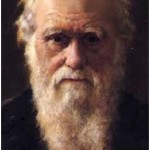 Charles Darwin would probably be surprised by today’s claims of “settled science.”
Charles Darwin would probably be surprised by today’s claims of “settled science.”
In Canada the issue of so-called same-sex “marriage” is “settled” and any questioning is considered “hate speech,” putting a damper on the freedom of speech. (For the story on this see Same-Sex Marriage Ten Years On: Lessons from Canada.)
Similarly, the issue of global warming is “settled science.” Dr. Robert Watson, a climate scientist and Director of the Tyndall Center for Climate Change Research, is famously quoted as saying, “The science is settled … We’re not going to reopen it here.” From a scientist we move to a politician. In his 2014 State of the Union speech, President Barack Obama proclaimed, “The debate is settled. Climate change is a fact.”
These are just two examples of the tyranny of modern fundamentalist atheists.
Modern atheistic philosophy is a product of the ideology of Darwinism or Evolutionism. Dr. D. M. S. Watson, the Jodrell Professor of Zoology and Comparative Anatomy at University College, London, states the faith of the modern evolutionist:
Evolution . . . is accepted by zoologists not because it has been observed to occur or . . . can be proved by logically coherent evidence to be true, but because the only alternative, special creation, is clearly incredible.
Darwinism is a comprehensive belief system that encompasses all of life. Herbert Spencer, an English philosopher, biologist, anthropologist, and sociologist, coined the evolutionary term “survival of the fittest.” When the foundation for the pursuit of truth–a Judeo-Christian worldview– is jettisoned, all that is left is the pursuit of power as established by the Darwinian doctrine.
This is why moderns use coercion and intimidation to stifle debate. The old virtues of free thinking and inquiry in the pursuit of truth are now squashed by political correctness. The new virtue is tolerance. Anyone who challenges cultural relativism and political correctness (i.e. the ideas or policies of the cultural elites) is labeled sexist, homophobic, anti-science, anti-choice, bigoted, etc.
In contrast to the doctrinaire statements of fundamentalist atheists, Charles Darwin had room for doubts. He had reservations both scientific and metaphysical in nature. Nancy Pearcey’s excellent book Total Truth has rekindled my interest in this subject.
Darwin thought his own theory was “grievously hypothetical”
Linguist John Oller and biochemist John Omdahl wrote in The Creation Hypothesis:
Even Charles Darwin thought his own theory was “grievously hypothetical” and gave emotional content to his doubts when he said, “The eye to this day gives me a cold shudder.” To think the eye had evolved by natural selection, Darwin said, “seems, I freely confess, absurd in the highest possible degree.” But he thought the same about something as simple as a peacock’s feather, which, he said, “makes me sick. ” Of course, anyone who has knowledge of the intricacies of the human eye and other living structures immediately realizes the problem Darwin sensed. How could an organ of such an intricate magnificence ever have originated via random chance? [1]
Darwin speaks of struggling with “horrid doubts.” These seem to have stemmed from both scientific and metaphysical skepticism within his soul.
With me, the horrid doubt always arises whether the convictions of a man’s mind, which has been developed from the mind of the lower animals, are of any value or at all trustworthy. [2]
We get further light on Darwin’s doubts from his son, Francis, who edited The Life and Letters of Charles Darwin, Volumes I & II. –
- “I cannot too strongly express my conviction of the general truth of my doctrines, and God knows I have never shirked a difficulty.” (Darwin to Charles Lyell Sept. 20, 1859) –
- “About the weak points I agree. The eye to this day gives me a cold shudder, but when I think of the fine known gradations, my reason tells me I ought to conquer the cold shudder.” (Darwin to Asa Gray [a Christian minister] Feb. ?, 1860)
- “Henslow [says he]… will go a very little way with us [in accepting the Darwinian theory of evolution], but brings up no real argument against going further. He also shudders at the eye! It is really curious (and perhaps is an argument in our favour) how differently different opposers view the subject… Baden Powell says he never read anything so conclusive as my statement about the eye!” (Darwin to Charles Lyell Feb. 15, 1860)
- “To recur to the eye. I really think it would have been dishonest, not to have faced the difficulty; and worse… it would have been impolitic I think, for it would have been thrown in my teeth, as H. Holland threw the bones of the ear, till Huxley shut him up by showing what a fine gradation occurred amongst living creatures.” (Darwin to Charles Lyell Feb. 23, 1860)
- “…I remember well the time when the thought of the eye made me cold all over, but I have got over this stage of the complaint, and now small trifling particulars of structure often make me feel uncomfortable. The sight of a feather in a peacock’s tail, whenever I gaze at it, makes me sick!” (Darwin to Asa Gray Apr. 3, 1860)
- “For the life of me I cannot see any difficulty in natural selection producing the most exquisite structure, if such structure can be arrived at by gradation, and I know from experience how hard it is to name any structure towards which at least some gradations are not known.” (Darwin to Charles Lyell Apr. 1860)
For more on this subject see Darwin’s Doubts by Stephen Meyer.
– Darrow Miller
[1] Creation Hypothesis pg 274.
[2] From Francis Darwin’s Life and Letters of Charles Darwin.






1 Comment